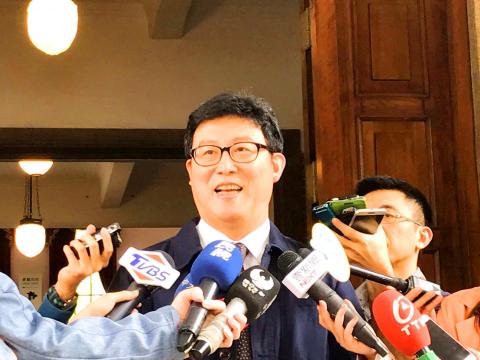Following the decapitation of statues of former President Chiang Kai-shek (蔣介石) and Japanese engineer Yoichi Hatta, a Democratic Progressive Party (DPP) lawmaker yesterday said he has drafted a bill that would repurpose the Chiang Kai-shek (蔣介石) Memorial Hall and relocate all the nation’s Chiang statues.
DPP Legislator Pasuya Yao (姚文智) said that he would today begin seeking endorsements from other lawmakers for the bill, which would see the abolishment of the Organization Act of National Chiang Kai-shek Memorial Management Office (國立中正紀念堂管理處組織法).
The proposal seeks to shutter the memorial hall to remove all symbols associated with Chiang and then refurbish it for other purposes, and the relocation of all Chiang statues nationwide to Chiang’s mausoleum in Taoyuan’s Dasi District (大溪).

Photo: CNA
“Statues [of Chiang] are the final remnant of the [Chinese Nationalist Party (KMT)] authoritarian regime, which has to be removed if a full-fledged democracy is to be realized,” Yao said
Yao, who has also advocated the phasing out of coins featuring Chiang’s portrait, said that President Tsai Ing-wen (蔡英文) would be blamed if the hall is not closed in the near future.
“It is the government’s fault that different groups in society have taken to engaging in vandalism,” Yao said, referring to the statue decapitations.
Hatta was a renowned civil engineer who built major irrigation systems in Taiwan during the Japanese colonial period. A statue of him was beheaded in Tainan earlier this month, allegedly by a former Taipei City councilor linked to a pro-unification group, as an act of revenge against the beheading of Chiang statues.
The vandalism has sparked a heated debate along political and ethnic lines about the legacy of the KMT government and the Japanese colonial era.
Retired army lieutenant general Wu Sz-huai (吳斯懷), who was at the center of a scandal involving retired generals participating in a political event in Beijing, said that the government’s acquiescence in the vandalizing of Chiang statues and its “honoring of Japanese” would intensify problems between ethnic groups, and “people would be prompted to vandalize totems of Japan.”
“It is because transitional justice has not been fully implemented that people are making such threats,” Yao said. “The last mile of transitional justice is the removal of authoritarian symbols. The government has to remove all those symbols to prevent conflicts.”
Meanwhile, in an apparent dig at Taipei Mayor Ko Wen-je (柯文哲), who has voiced opposition to proposals to remove Chiang symbols, Yao said there are still 47 Chiang statues in Taipei, which should be removed immediately.
Ko’s suggestion that past conflicts should be put aside in pursuit of a common future demonstrates his ignorance of history, as the commemoration of Chiang was institutionalized through abuse of power, and authoritarianism should be expunged from society, Yao said.

A magnitude 7.0 earthquake struck off Yilan at 11:05pm yesterday, the Central Weather Administration (CWA) said. The epicenter was located at sea, about 32.3km east of Yilan County Hall, at a depth of 72.8km, CWA data showed There were no immediate reports of damage. The intensity of the quake, which gauges the actual effect of a seismic event, measured 4 in Yilan County area on Taiwan’s seven-tier intensity scale, the data showed. It measured 4 in other parts of eastern, northern and central Taiwan as well as Tainan, and 3 in Kaohsiung and Pingtung County, and 2 in Lienchiang and Penghu counties and 1

FOREIGN INTERFERENCE: Beijing would likely intensify public opinion warfare in next year’s local elections to prevent Lai from getting re-elected, the ‘Yomiuri Shimbun’ said Internal documents from a Chinese artificial intelligence (AI) company indicated that China has been using the technology to intervene in foreign elections, including propaganda targeting Taiwan’s local elections next year and presidential elections in 2028, a Japanese newspaper reported yesterday. The Institute of National Security of Vanderbilt University obtained nearly 400 pages of documents from GoLaxy, a company with ties to the Chinese government, and found evidence that it had apparently deployed sophisticated, AI-driven propaganda campaigns in Hong Kong and Taiwan to shape public opinion, the Yomiuri Shimbun reported. GoLaxy provides insights, situation analysis and public opinion-shaping technology by conducting network surveillance

Taiwan is gearing up to celebrate the New Year at events across the country, headlined by the annual countdown and Taipei 101 fireworks display at midnight. Many of the events are to be livesteamed online. See below for lineups and links: Taipei Taipei’s New Year’s Party 2026 is to begin at 7pm and run until 1am, with the theme “Sailing to the Future.” South Korean girl group KARA is headlining the concert at Taipei City Hall Plaza, with additional performances by Amber An (安心亞), Nick Chou (周湯豪), hip-hop trio Nine One One (玖壹壹), Bii (畢書盡), girl group Genblue (幻藍小熊) and more. The festivities are to

AFTERMATH: The Taipei City Government said it received 39 minor incident reports including gas leaks, water leaks and outages, and a damaged traffic signal A magnitude 7.0 earthquake struck off Taiwan’s northeastern coast late on Saturday, producing only two major aftershocks as of yesterday noon, the Central Weather Administration (CWA) said. The limited aftershocks contrast with last year’s major earthquake in Hualien County, as Saturday’s earthquake occurred at a greater depth in a subduction zone. Saturday’s earthquake struck at 11:05pm, with its hypocenter about 32.3km east of Yilan County Hall, at a depth of 72.8km. Shaking was felt in 17 administrative regions north of Tainan and in eastern Taiwan, reaching intensity level 4 on Taiwan’s seven-tier seismic scale, the CWA said. In Hualien, the